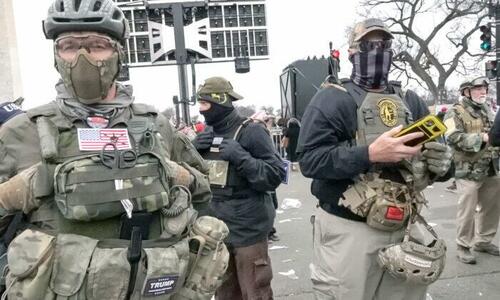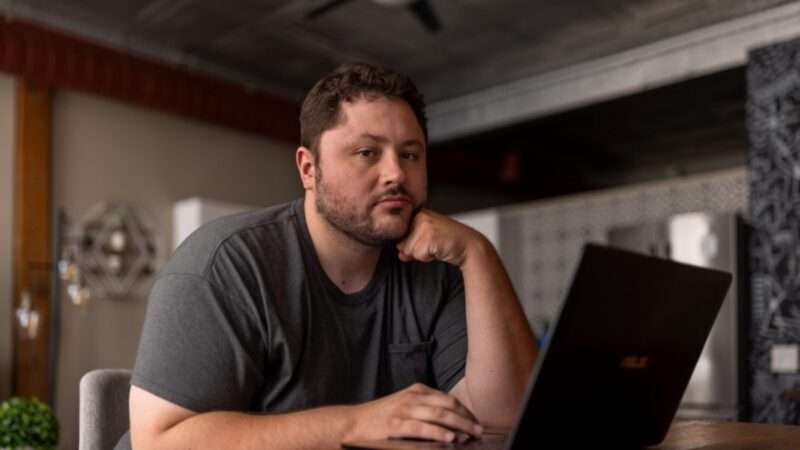Six years ago, police in Parma, Ohio, arrested Anthony Novak for making fun of them. By creating a parody of the police department’s official Facebook page, they alleged, Novak had violated a broadly worded state law against using a computer to “disrupt, interrupt, or impair” police services. After a jury unanimously acquitted Novak of that felony, he sued seven officers for violating his First Amendment rights.
Novak’s arrest looked like a clear case of abusing the criminal law to punish someone for constitutionally protected speech. But this year the U.S. Court of Appeals for the 6th Circuit concluded that the officers he sued were protected by qualified immunity, which shields police from liability for violating constitutional rights unless their alleged misconduct ran afoul of “clearly established” law. This week the Institute for Justice asked the Supreme Court to review that decision, warning that the 6th Circuit’s application of qualified immunity is a license for blatant violations of the First Amendment.
Novak’s Facebook parody, which was live for all of 12 hours, copied the police department’s name and profile picture. But the account was listed under “community” pages rather than the designation for government agencies. For readers who might have overlooked that distinction, there were plenty of other clues that the page was an elaborate joke. Novak changed the department’s motto from “We know crime” to “We no crime,” for example, and his six posts were flagrantly farcical.
One post announced “our official stay inside and catch up with the family day,” during which anyone venturing outside between noon and 9 p.m. would be arrested. Another described a “Pedophile Reform event” where any participant who visited all of the “learning stations,” including a “‘no means no’ station filled with puzzles and quizzes,” would be “removed from the sex offender registry and accepted as an honorary police officer.” A job notice said anyone who passed a “15 question multiple choice definition test followed by a hearing test” would be “be accepted as an officer” but added that the department “is strongly encouraging minorities to not apply.”
The page noted the robbery of a local Subway outlet by a white man while seeking the public’s assistance in apprehending an “African American woman” who was wanted for loitering in front of the sandwich shop during the robbery. Another post warned Parma residents about a new law that barred them “from giving ANY HOMELESS person food, money, or shelter in our city for 90 days”—a measure aimed at encouraging “the homeless population” to “leave our city due to starvation.” An announcement offered teenagers abortions, to be performed in a van in the parking lot of a local supermarket “using an experimental technique discovered by the Parma Police Department.”
Eleven Facebook users called the police department’s nonemergency line about Novak’s spoof, which was the basis for the claim that he had disrupted police operations. When the case was presented to a grand jury, Detective Thomas Connor claimed the callers “honest to God believed” that Novak’s creation was the department’s official page. But when Novak sued Connor and six other officers, the Institute for Justice notes in its Supreme Court petition, “Connor admitted at deposition that none of the callers thought that.”
After a federal judge declined to dismiss Novak’s lawsuit, a three-judge panel of the 6th Circuit agreed that the case should proceed. “When it comes to parody,” Judge Amul Thapar wrote in that 2019 decision, “the law requires a reasonable reader standard, not a ‘most gullible person on Facebook’ standard. The First Amendment does not depend on whether everyone is in on the joke. Neither is it bothered by public disapproval, whether tepid or red-hot.”
Regardless of what the public or the police thought about Novak’s humor, the 6th Circuit concluded, “Novak has alleged enough facts that a reasonable jury could find that his page was a parody” protected by the First Amendment. The court added that “whether the police had probable cause to arrest Novak is an issue of fact” that had not yet been resolved.
“If the officers did not have probable cause, they are not entitled to qualified immunity, and Novak can attempt to show the arrest was retaliatory,” Thapar wrote. “If the officers did have probable cause, they are entitled to qualified immunity even if Novak’s page was protected speech because the law at the time did not clearly establish that charging Novak under the statute would violate his constitutional rights.”
Three years later, in another opinion by Thapar, the 6th Circuit saw things differently. At that point, the trial court had granted the defendants’ motion for summary judgment, concluding that the officers were protected by qualified immunity. The appeals court agreed.
Thapar, who previously seemed to think it was obvious that Novak’s Facebook page qualified as parody, cited two reasons for questioning that conclusion. Novak had deleted comments describing the page as fake, which he thought ruined the joke, and had reposted a police department warning about the ersatz account, which he thought made the joke funnier. “Whether these actions—deleting comments that made clear the page was fake and reposting the Department’s warning message—are protected speech is a difficult question,” Thapar averred. “But while probable cause here may be difficult, qualified immunity is not.”
The officers “reasonably found probable cause in an unsettled case judges can debate,” Thapar said in that 2022 decision. “Indeed, Novak has not identified a case that clearly establishes deleting comments or copying the official warning is protected speech….The officers could reasonably believe that some of Novak’s Facebook activity was not parody, not protected, and fair grounds for probable cause.”
The 6th Circuit noted that the cops were not alone in reaching that conclusion. “Both the City’s Law Director and the judges who issued the warrants agreed with them,” Thapar wrote. “Reassurance from no fewer than three other officials further supports finding that the officers ‘reasonably,’ even if ‘mistakenly,’ concluded that probable cause existed.”
The agreement that Thapar saw as reassuring from the officers’ perspective is deeply disconcerting for anyone who recognizes the threat posed by arresting people for criticizing the police. “Granting the officers qualified immunity does not mean their actions were justified or should be condoned,” Thapar wrote. “Indeed, it is cases like these when government officials have a particular obligation to act reasonably. Was Novak’s Facebook page worth a criminal prosecution, two appeals, and countless hours of Novak’s and the government’s time? We have our doubts. And from the beginning, any one of the officials involved could have allowed ‘the entire story to turn out differently,’ simply by saying ‘No.’ Unfortunately, no one did.”
Decisions like this one are unlikely to encourage such caution. To the contrary, they imply that police officers who pursue petty vendettas under the cloak of law enforcement need not worry much about the possibility that their victims will try to hold them accountable. As a legal matter, the 6th Circuit said, the cops acted reasonably in arresting Novak. At the same time, it implied that their actions were clearly unreasonable. Something has gone terribly wrong when legal conclusions are so divorced from reality.
As the Institute for Justice notes in its petition, the appeals court’s decision deepens a circuit split on the interaction between qualified immunity and well-established First Amendment principles:
The Fifth, Ninth, and Tenth Circuits hold that general First Amendment principles provide government officials fair warning that they cannot punish individuals for exercising their speech rights. In those circuits, protected speech cannot provide the sole basis for probable cause, and a plaintiff need not identify an earlier decision addressing the specific speech at issue. The Sixth, Eighth, and Eleventh Circuits hold, on the other hand, that probable cause from broad interpretations of vague criminal statutes supports qualified immunity and renders the First Amendment irrelevant unless an earlier case clearly establishes that the specific speech at issue is protected. As a result, police in those circuits may arrest and jail someone for criticizing the government, and they cannot be sued for doing so.
This case illustrates how difficult it is for victims of police abuse to get their day in court when qualified immunity is interpreted to require prior decisions with nearly identical facts. The 6th Circuit complained that Novak “has not identified a case that clearly establishes deleting comments or copying the official warning is protected speech.” Without such a highly specific precedent, it concluded, Novak could not even attempt to persuade a jury that his rights had been violated.
That sort of demand can be impossible to satisfy even for plaintiffs who have suffered outrageous abuses. It is especially troubling in the First Amendment context, where the mere possibility of criminal charges has a chilling effect on protected speech.
In his 2019 opinion, Thapar noted the danger posed by statutes as vague as Ohio’s law against disruption of police operations. “Taken at face value, the Ohio law seems to criminalize speech well in the heartland of First Amendment protection,” he wrote. “This broad reach gives the police cover to retaliate against all kinds of speech under the banner of probable cause. Critical online comments, mail-in or phone bank campaigns, or even informational websites that incite others to ‘disrupt’ or ‘interrupt’ police operations could violate the law.”
The Supreme Court has recognized that constitutional violations can be so obvious that precedents directly on point are not necessary to overcome qualified immunity. The Institute for Justice is urging the Court to take that approach in this case, assuming that it is not ready to reconsider qualified immunity in general.
“Anthony Novak was arrested, jailed, and prosecuted because he made fun of his local police department on Facebook,” says Institute for Justice attorney Patrick Jaicomo. “Razzing police isn’t a crime; it’s protected by the First Amendment. In fact, parodies like those Anthony posted have an American history going back to the time of George Washington. The Supreme Court should make it clear that qualified immunity cannot protect police officers who punish people for exercising the freedom of speech.”
The post A Parodist Asks SCOTUS To Let Him Sue the Cops Who Arrested Him for Making Fun of Them appeared first on Reason.com.
from Latest https://ift.tt/Gqd8l5s
via IFTTT












 KC 3.0
KC 3.0 